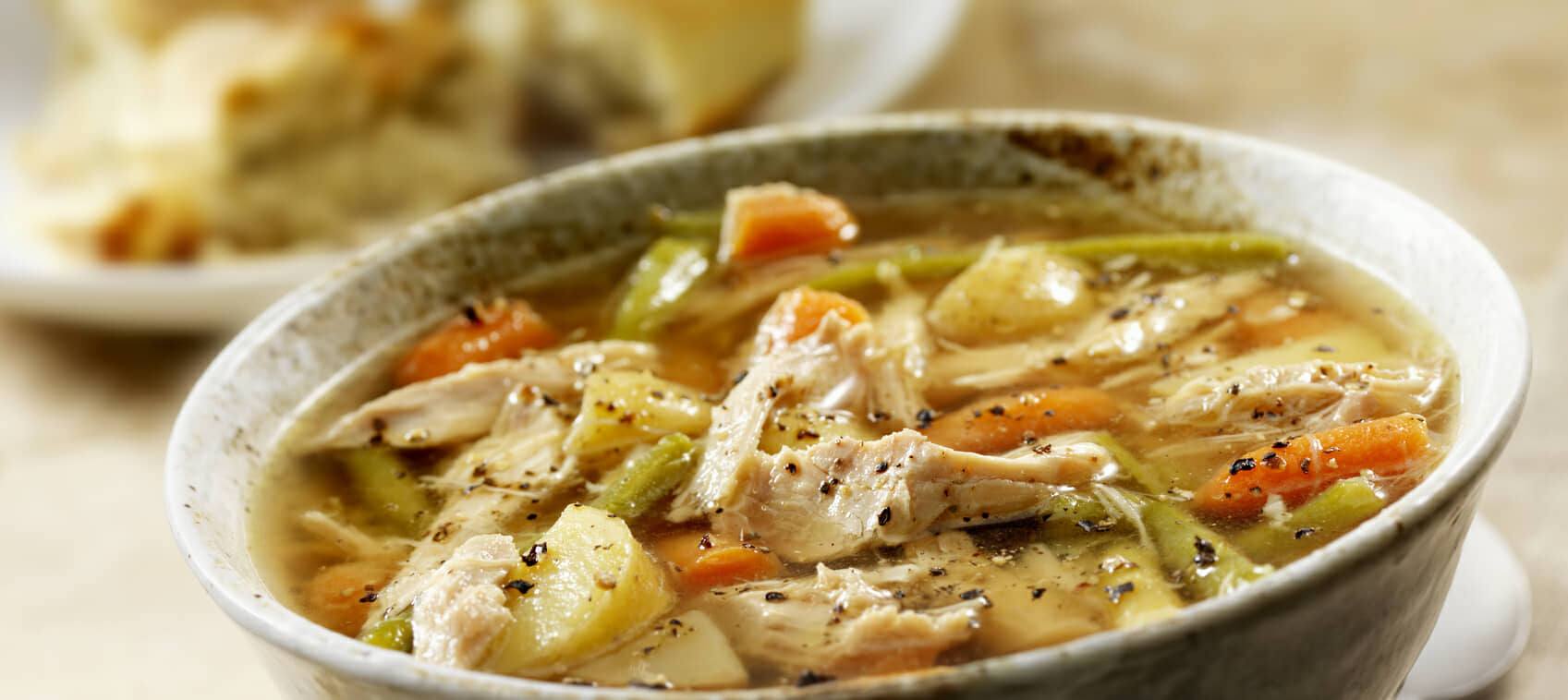
Every year around this time I get many questions about the best natural cold and flu treatments. This season, I’m trotting out an old remedy: chicken soup. However, it’s not your regular chicken soup. This “souped-up” chicken soup is loaded with hot spices to support your immune system and to help thin and expel mucus.
People with upper respiratory viruses, asthma, and bronchitis usually produce excess mucus, which eventually gets into the lungs. This buildup often leads to bronchospasms—the constriction of muscles in the walls of the airways.
These spasms can cause breathing problems and sleepless nights. You don’t hear much about bronchospasms, but our constant exposure to airborne toxins and particles makes them a real health challenge.
Mucus—Both a Blessing and a Curse for Your Lungs
The lungs produce mucus as a protective agent. It traps bacteria, antigens, dust, and other irritants that enter the respiratory passages during breathing. In this way, mucus is a blessing.
However, the overproduction of mucus is a symptom of many common illnesses—including colds, flu, asthma, allergies, and chronic bronchitis. Coughing is the body’s way to get rid of the excess, but this effort can be challenging because of the thick and sticky nature of mucus. In fact, I have had patients suffer minor strokes, pass out, pull muscles, or even fracture ribs as a result of their coughing attacks.
Don’t Ignore the Overproduction of Mucus
Several years ago, I came across the work of Irwin Ziment, M.D.—a retired pulmonologist and professor of medicine at UCLA. More than three decades ago, he discovered that ancient healers used natural substances such as garlic and hot peppers, as well as chicken soup to address the problem. In fact, he routinely prescribed chicken soup with garlic and hot peppers as a complement to modern drug treatments.
Treating the bronchospasms without treating the mucus is backward. As he explains it, “Bronchospasm is always accompanied by mucus, but the mucus is largely ignored by doctors; only the bronchospasm gets treated.” It’s actually the mucus that’s helping to drive the bronchospasms.
Chicken Soup to the Rescue
How does chicken soup help? Chicken soup contains a natural amino acid called cysteine. A form of this amino acid, called N-acetyl cysteine, is a powerful antioxidant that strengthens immunity. It has been one of my favorite winter supplements for years because it’s been shown to be a natural flu treatment.
But it’s not enough to just eat chicken soup. You need to spike it with garlic, hot peppers, hot curry, and/or Tabasco sauce. That’s because the garlic and hot peppers add heat and pungency, and are a knockout punch against mucus.
While this works with any chicken soup recipe, here's one of my favorites. In a soup or large sauce pan, saute chopped onion and a few tablespoons of olive oil on low-ish heat until translucent. Add chopped carrots and celery until partially cooked. Add salt, pepper, a few bay leaves, a small organic chicken or chicken parts, and at least enough filtered water to cover the chicken. Bring this mixture to a boil, then simmer on low-ish heat.
After about 2 hours or so, take the chicken out and remove the bones and skin, returning the meat back to the soup. Add any beans or fresh vegetables like sliced green peppers or zucchini, as well as sliced hot peppers, garlic, and/or ginger and continue simmering for 20 minutes or so. Top with chopped fresh herbs, like parsley or cilantro. Try experimenting with modest amounts of seasonings and spicy or pungent ingredients, then add more to taste.
It may sound tortuous but, according to Dr. Ziment, when properly prepared the soup should bring tears to the eyes and cause a runny nose as it loosens the mucus. I recommend a more measured approach. Start with a mild mix and work up to a level that you can handle and that is also effective at clearing your sinuses.
A Strong Physical Reaction to the Soup Means It’s Working
A strong physical reaction to the soup is a sure sign that it’s having the desired effect. A runny nose and watery eyes mean the body has been stimulated to loosen mucus at even the deepest levels—making it is easier to cough out the congestion and feel better. There may be no drug that can more effectively break up mucus in your lungs, nor any inhaler that works as deeply.
The drugs that affect mucus, such as atropine, merely dry the mucous membranes. And, as the body starts to require the drugs to keep the mucus levels down, a “rebound effect” occurs. Not only does the mucus return when the drugs wear off, it often returns at levels that are worse than they were before taking the drug.
In our pharmaceutically controlled medical system, I doubt chicken soup (even spiced up with garlic and Tabasco) will ever get due recognition as a standard treatment for respiratory ailments. However, it certainly should be something that doctors recommend. It’s natural, safe, and effective. It’s no wonder that it’s been such a longstanding traditional remedy.
WATCH: Dr. Sinatra Makes Chicken Soup!
References
Ziment I. Five thousand years of attacking asthma: an overview. Resp Care. 1986;31(2):117–136.
Ziment I. What to expect from expectorants. JAMA. 1976;236(2): 193–194.


